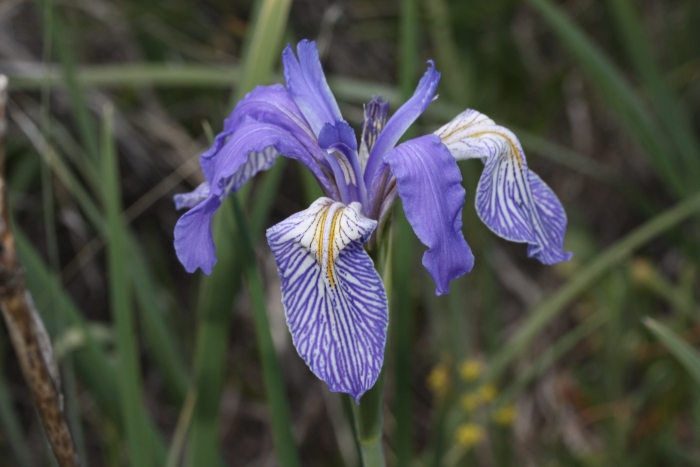Rocky Mountain Iris
(Iris missouriensis)
Rocky Mountain Iris (Iris missouriensis)
/
/

Walter Siegmund (talk)
CC BY-SA 3.0
Image By:
Walter Siegmund (talk)
Recorded By:
Copyright:
CC BY-SA 3.0
Copyright Notice:
Photo by: Walter Siegmund (talk) | License Type: CC BY-SA 3.0 | License URL: https://creativecommons.org/licenses/by-sa/3.0 | Uploader: Wsiegmund | Publisher: Wikimedia Commons | Title: Iris_missouriensis_9425.JPG | Notes: == {{int:filedesc}} == {{Information | Description = {{en|1= Close-up of a ''[[Iris ruthenica]]'' (presumably) flower.}} | Source = {{own}} | Author = {{u |Gyft Xelz}} | Date = 2016-06-05 06:07:32 UTC | Permission = | other_versions = {{Other versions/.

















































Estimated Native Range
Summary
Iris missouriensis, commonly known as Rocky Mountain Iris, is a deciduous perennial herb native to moist meadows, streambanks, and grassy slopes in the Western USA and Western Canada. It typically grows 20 to 40 centimeters (7+7⁄8 to 15+3⁄4 inches) high with linear basal leaves that are 5 to 10 mm wide and about the same height as the unbranched scapes (flowering stems). The inflorescence usually consists of one or two, occasionally three or four, flowers. Each flower has three light to dark blue, spreading or reflexed sepals lined with purple and three smaller upright blue petals, blooming from late spring to early summer. The flowers are moderately showy and are followed by large fruit capsules. Over time, plant populations tend to spread outward from the older plants, creating a ring-like pattern.
Rocky Mountain Iris is valued for its hardiness and the delicate beauty of its blue flowers. It is often used in naturalistic plantings, such as wildflower gardens, and in areas that mimic its native riparian habitats. This species requires consistently moist soil and can tolerate a range of drainage conditions. It thrives in full sun to part shade. While generally easy to maintain, it can be susceptible to iris borer and fungal diseases such as leaf spot. It is not known to have aggressive roots or other significant problems.CC BY-SA 4.0
Rocky Mountain Iris is valued for its hardiness and the delicate beauty of its blue flowers. It is often used in naturalistic plantings, such as wildflower gardens, and in areas that mimic its native riparian habitats. This species requires consistently moist soil and can tolerate a range of drainage conditions. It thrives in full sun to part shade. While generally easy to maintain, it can be susceptible to iris borer and fungal diseases such as leaf spot. It is not known to have aggressive roots or other significant problems.CC BY-SA 4.0
Plant Description
- Plant Type: Herb
- Height: 1-2 feet
- Width: 0.8-1 feet
- Growth Rate: Rapid
- Flower Color: Blue, Purple, White
- Flowering Season: Spring
- Leaf Retention: Deciduous
Growth Requirements
- Sun: Full Sun, Part Shade
- Water: High
- Drainage: Fast, Medium, Slow
Common Uses
Bee Garden, Bird Garden, Butterfly Garden, Deer Resistant, Fire Resistant, Hummingbird Garden, Low Maintenance, Rabbit Resistant, Rock Garden, Salt Tolerant, Showy Flowers, Water Garden
Natural Habitat
Moist meadows, streambanks, and grassy slopes
Other Names
Common Names: Western Blue Flag, Wild Iris, Missouri Flag, Western Blue Iris, Iris Du Missouri
Scientific Names: , Iris missouriensis, Iris missouriensis var. pelogonus, Iris missouriensis f. angustispatha, Iris montana, Iris missouriensis var. arizonica, Iris longipetala var. montana, Iris pelogonus, Dielsiris arizonica, Dielsiris missouriensis
GBIF Accepted Name: Iris missouriensis Nutt.